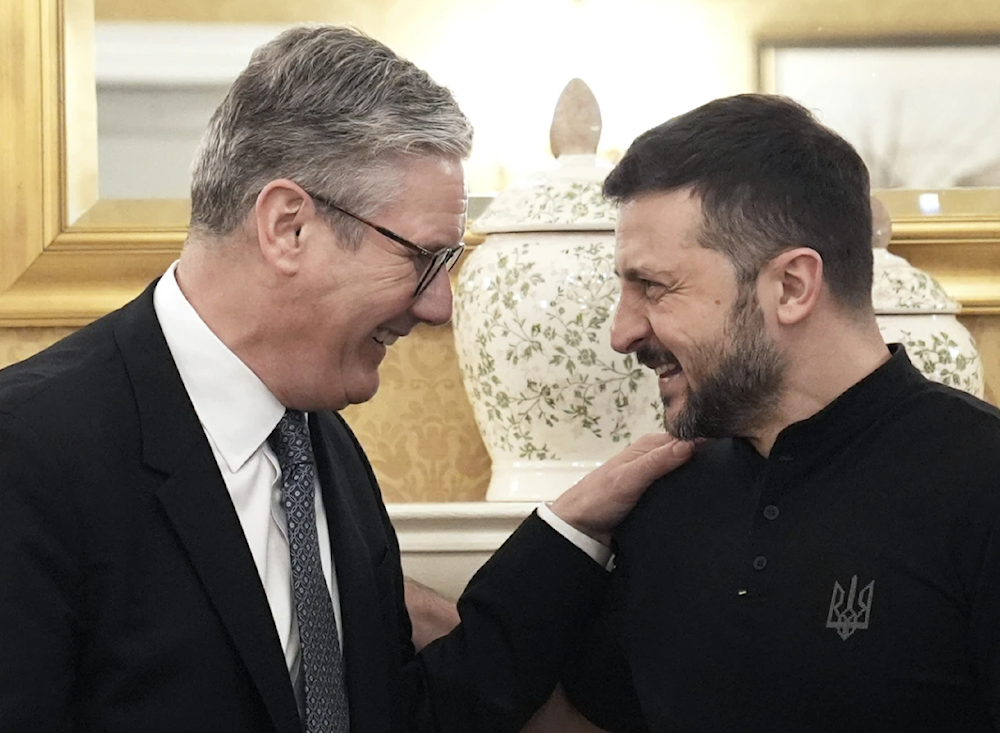Zelensky urges NATO leaders to lift all limits on striking Russia
Countries that lifted restrictions on Ukraine striking within Russia maintained some constraints on how far and under what conditions Kiev might strike.
-

Britain's Prime Minister Keir Starmer greets Ukrainian President Volodymyr Zelensky during a bilateral meeting in Washington ahead of the NATO summit on July 10, 2024. (AP)
Ukraine's President Volodymyr Zelensky urged NATO leaders to lift all limits on allowing Kiev to strike inside Russia with Western weapons as they concluded a three-day summit in Washington.
The Ukrainian leader met with his NATO counterparts after getting pledges of new air defenses for Ukraine and as allies began transferring long-awaited F-16 jets.
But Zelensky urged Kiev's supporters, particularly the United States, to go farther, including giving his outnumbered soldiers more freedom to strike inside Russia, telling the press that "if we want to win, if we want to prevail, if we want to save our country and to defend it, we need to lift all the limitations."
In May, key allies such as Washington and Germany lifted restrictions on Ukraine striking within Russia but maintained some constraints on how far and under what conditions Kiev might strike.
NATO chief Jens Stoltenberg expressed that the "only way to hit military targets" is to "hit them on Russian territory, because the frontline and the borderline is more or less the same," while the alliance's leaders promised $43 billion in military aid "within the next year."
Zelensky stated that he planned to have the air defenses, including one new Patriot system from the US, delivered "as soon as possible," adding that "we are doing and will continue to do everything to ensure that the day comes when Ukraine is invited and becomes a NATO member, and I am confident we will achieve this."
Missiles to Germany
On Wednesday, the US also revealed that "episodic deployments" of long-range missiles to Germany will begin in 2026, detailing they would be permanently stationed there and would have "significantly longer range" than current US weapons in Europe.
German Chancellor Olaf Scholz hailed the measure, saying it would contribute to "securing peace".
However, on Thursday, the Kremlin responded, and Kremlin spokesperson Dmitry Peskov said Russia was contemplating "response measures" to counter the alliance's "very serious threat."
Stoltenberg stated that there was a Russian campaign to conduct "hostile actions" against NATO members with "sabotage attempts, with cyber attacks, with arson, with different types of hostile actions," calling it an attempt to intimidate NATO allies from continuing to support Ukraine.
NATO has titled China a "decisive enabler" of Russia's continued operations in Ukraine, lambasting Beijing for its partnership with Moscow, a declaration of NATO leaders at their summit in Washington claimed.
On the other hand, a spokesperson for China's mission to the European Union has warned against NATO's provocations of confrontation with China over its ties with neighboring Russia.
"It is known to all that China is not the creator [of] the Ukraine crisis. China's position on Ukraine is open and aboveboard," they stressed.
"NATO should stop hyping up the so-called China threat and provoking confrontation and rivalry, and do more to contribute to world peace and stability," the statement concluded.
Ukraine and NATO should disappear: Medvedev
Either Ukraine or the NATO alliance should disappear, former Russian President Dmitry Medvedev said on Thursday, concerning the alliance's decision to grant Ukraine membership "irreversible".
“The conclusion is obvious. We have to do everything to make sure that the ‘irreversible path of Ukraine’ towards NATO ends with either the disappearance of Ukraine, or the disappearance of NATO. Better, both,” Medvedev said on Thursday.
Russia has frequently stressed that the former Soviet state's adoption into the alliance is crossing a "red line" and that the European bloc was one of the main triggers for Russia's war with Ukraine.
Medvedev called for cautiousness should Ukraine accept Russia's terms for a ceasefire, including revoking their NATO aspirations. However, the politician warned that the acceptance of negotiated peace could spark internal unrest in Ukraine potentially a coup or the rise of a new radical government, reigniting hostilities between the two nations while jeopardizing Ukraine's sovereignty.

 4 Min Read
4 Min Read









